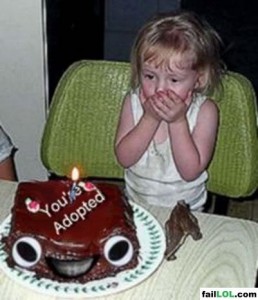A DadWagon proclamation: Fatherhood means learning to live with repulsion. From the moment our children emerge frog-like and slime-coated from the birth canal, we suffer and, silently, retch. But we put up with it all—through months and years of filthy diapers and ass-backwards temperature readings, on for even more years of crusty noses and spontaneous vomitings, only to wind up with teenagers for whom an hour-long argument about the merits of various human secretions counts as highbrow debate.
Still, though, repulsion is a difficult thing to get a handle on, to conquer and control. But this week, we tried, often valiantly.
Nathan was his customarily morbid self, pondering dead children, abandoned children, and Republican children. We expect him home soon from the Arizona borderlands, his eyes glazed over with saguaro fog.
Christopher’s preferred mode of repulsion, however, took a wry, understated form, as when he dismissed cutting-edge fatherhood research with a devastating “Okay, well, thanks.” Ouch! His pondering of the future of digital memory neatly sidestepped the horror he no doubt feels at seeing his beloved Polaroid camera replaced with Ashton Kutcher’s Nikon Coolpix.
Theodore… Well, his instinctive gut-quake was particularly (and oddly) joyous, as he introduced us to steroid boy and the fattest girl in the world, and contemplated an unavoidable encounter with his ex-wife. Attempts to be the Buddha’s beach ball and to poetaste were unsuccessful. The streets of Brooklyn still run with his bile.
Meanwhile, Matt: When he wasn’t shitting on sentimental fathers, excoriating pedophilophobic San Franciscans and contemplating the almost-tearful abandonment of his family, he was offering step-by-step instructions on how to screw up your children. And then there was this. Clearly, while the other ‘wagoneers are trying to come to terms with repulsion, the Lush-raiser has decided to embrace—nay, embody—the principle.
Have a nice weekend, and we’ll be back to horrify and amuse on Monday.

